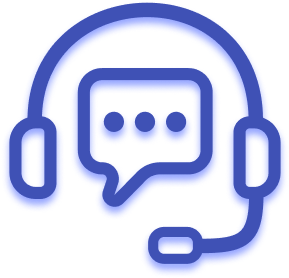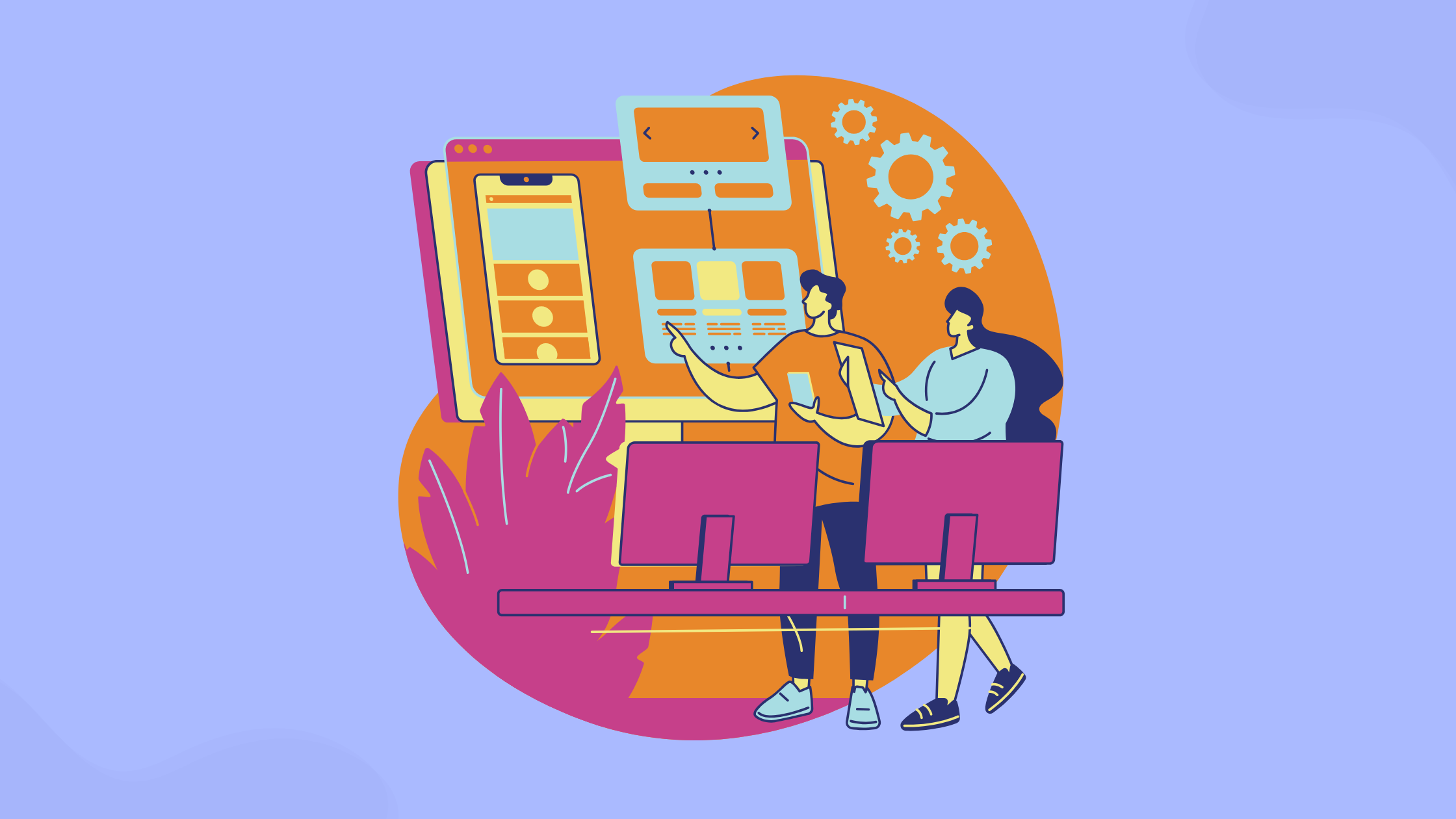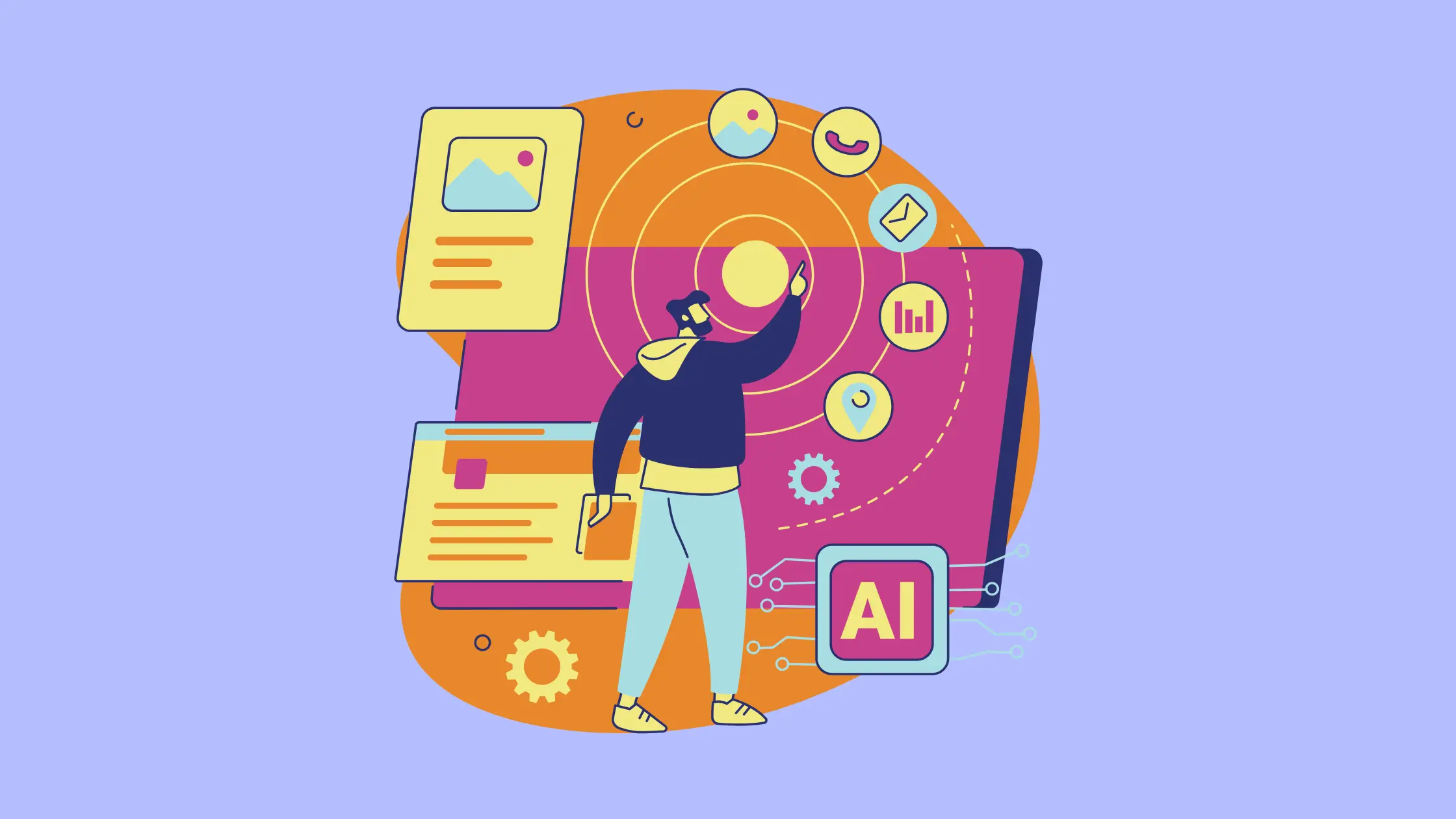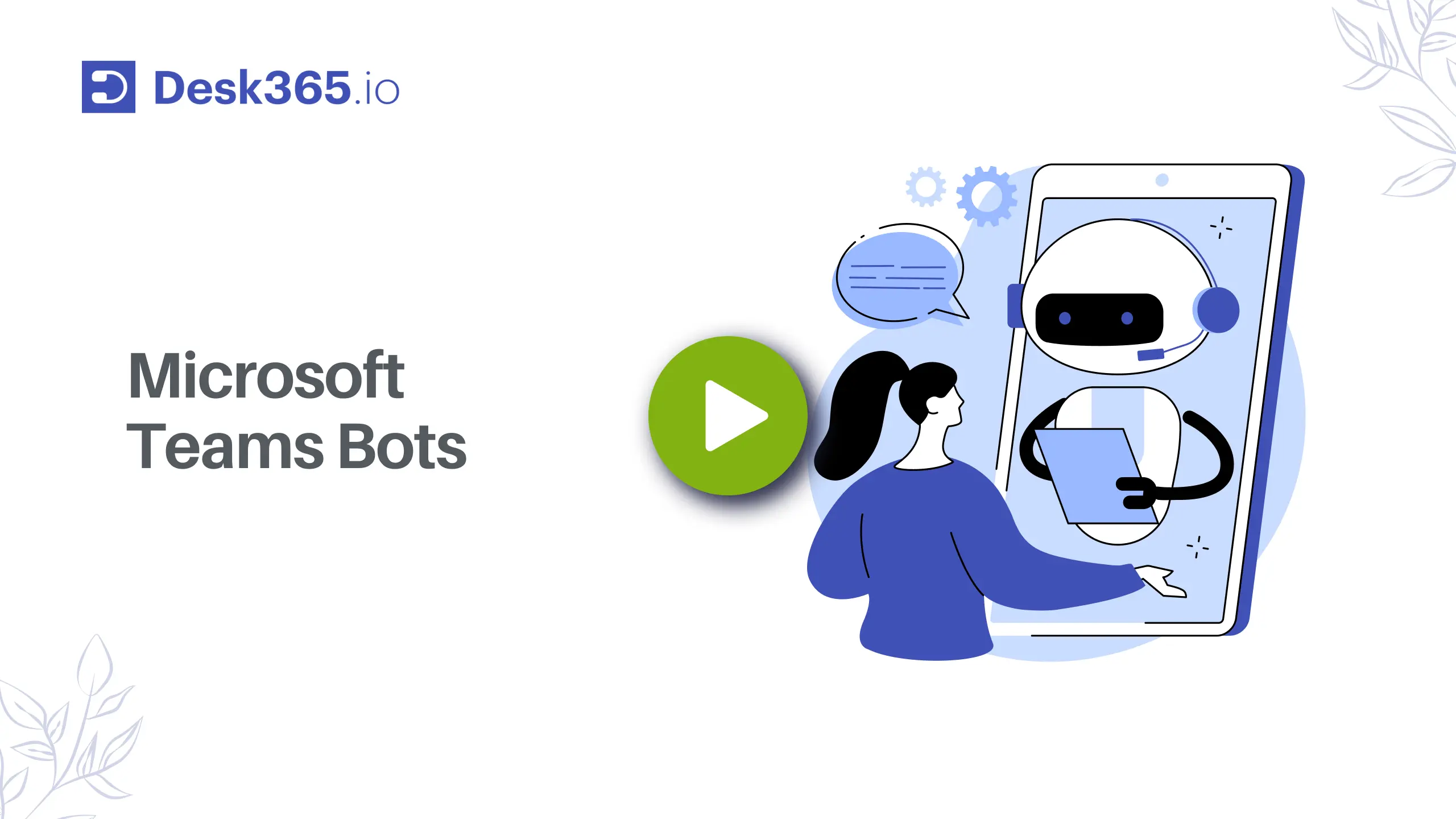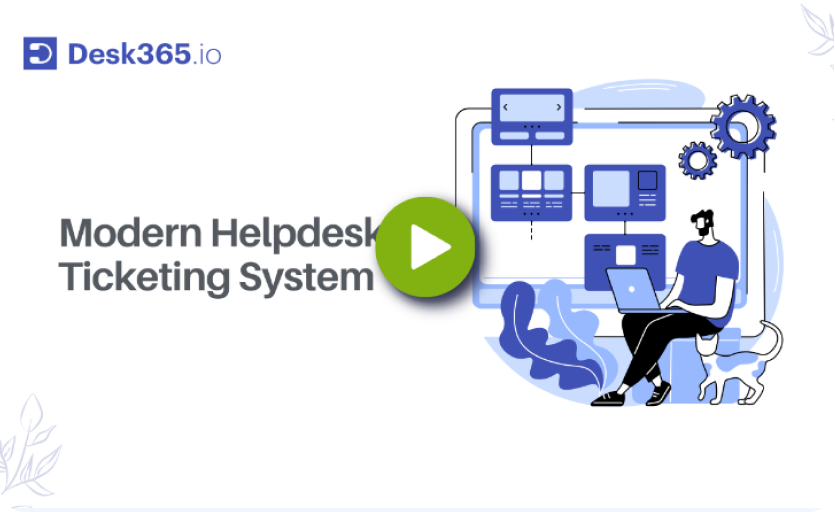As businesses grow, so do their customer service needs. The increase in the volume of customer inquiries can often overwhelm support teams, making it difficult for agents to deliver the level of service customers expect. In this context, an enterprise helpdesk software solution becomes essential.
With features like automation, AI assistance, omnichannel support, reporting and analytics, and self-service capabilities, a well-selected helpdesk platform can significantly streamline your organization’s support operations. But how do you choose the right one? This guide will help you navigate through the key features and benefits of enterprise helpdesk software, so you can select the best fit for your business.
What is enterprise helpdesk software?
Enterprise helpdesk software is specifically designed for large organizations that require a more robust, scalable solution to handle complex and high-volume customer support. Unlike basic helpdesk tools meant for small businesses, enterprise helpdesks cater to the needs of large teams and high-stakes inquiries from both external customers and internal employees.
At its core, an enterprise helpdesk serves as a centralized hub where support teams can manage and resolve customer and employee inquiries across various communication channels, including email, live chat, phone, and more. These systems also allow you to create self-service portals, giving customers access to frequently asked questions (FAQs), troubleshooting guides, and other helpful resources.
An enterprise helpdesk platform provides advanced features such as:
- Omnichannel support: Customers can reach support through their preferred channel.
- Automation and AI: Reduce manual work and improve efficiency.
- Service Level Agreement (SLA) management: Ensure compliance with your promised service levels.
- Reporting and analytics: Track performance and make data-driven decisions.
- Self-service: Let customers resolve issues on their own with knowledge bases and community forums.
Such platforms are typically tailored to support various departments within an enterprise, including HR, IT, Customer Service, and more. This makes them crucial tools for any large-scale business operation.
What does an enterprise helpdesk do?
Handling support for a large organization comes with its own set of challenges. A good enterprise helpdesk system is designed to make the lives of both customers and support agents easier. Here are the primary functions of enterprise helpdesk software:
1. Single point of contact
For large enterprises, customers might not always know who to contact for their specific issues. Enterprise helpdesk software centralizes all inquiries into one system, providing customers with a single point of contact for support. Whether the inquiry is technical, business-related, or about a product, the helpdesk system ensures that each support ticket is routed to the right team for resolution.
2. Self-service
Self-service is a key feature that allows customers to resolve common issues independently, reducing the burden on support agents. By creating a well-organized knowledge base or community forum, customers can find answers to frequently asked questions or troubleshoot problems on their own. Moreover, enterprise helpdesk systems can continuously improve the knowledge base by gathering feedback from users.
3. Reporting and analytics
Reporting and analytics tools help enterprises monitor the effectiveness of their support operations. Key helpdesk metrics such as first response time, resolution time, and customer satisfaction scores can be tracked to identify areas for improvement. Insights gathered from these reports enable businesses to fine-tune their customer support strategies and optimize agent performance.
4. Increased productivity through automation
Automating routine tasks can significantly enhance agent productivity. An enterprise helpdesk software should allow automation for ticket routing, response drafting, ticket escalations, and more. AI-driven assistance can also help agents by suggesting pre-written responses, escalating critical tickets, and automating follow-up tasks.
5. Omnichannel support
Enterprise helpdesks support a variety of communication channels, including email, live chat, phone calls, social media, and even in-app support. This omnichannel functionality ensures that customers can reach out for support on their preferred platform and receive seamless assistance regardless of the touchpoint they choose.
Benefits of using enterprise helpdesk system
When implemented properly, an enterprise helpdesk system offers several key benefits for both your support agents and customers:
1. Boosts agent productivity
One of the most significant benefits of enterprise helpdesk solution is that it improves agent efficiency by streamlining workflows. Features like AI-powered ticket routing, canned responses, automated workflows, and task management make it easier for agents to handle large volumes of support tickets. Agents no longer need to manually manage every single task, which frees them up to focus on more complex inquiries.
2. Enhances personalized service
Enterprise helpdesk platforms typically allow agents to access customer histories, preferences, and previous interactions. This means support agents can offer personalized responses that are contextually relevant to the customer’s issue. The system enables better relationship-building with customers by providing tailored service.
3. Improves customer satisfaction
When customers receive timely and relevant support, their satisfaction increases. With enterprise helpdesk software, agents can resolve tickets faster, offer personalized responses, and track their performance through feedback loops. Additionally, AI-driven solutions such as chatbots can help customers get quick answers at any time, further boosting satisfaction.
Recommended Reading:How to Improve Customer Service Response Times?
4. Scales support operations
As businesses expand, so do their support requirements. An enterprise helpdesk helps businesses scale their customer support operations by automating routine processes, managing increased ticket volumes, and leveraging AI tools. This ensures that businesses can keep up with the growing demand for support while maintaining high levels of service.
5. Cost savings
By reducing manual work through automation and self-service features, enterprise helpdesk software helps businesses cut down on operational costs. With AI-powered ticketing and streamlined workflows, businesses can reduce the need for a large support team, making it a cost-effective solution.
How to make the most of your enterprise helpdesk software
To get the best results from your enterprise helpdesk software, here are five best practices you should follow:
1. Leverage AI for automation
AI-powered tools are one of the most valuable features of the best helpdesk software. They can handle repetitive tasks like ticket triaging, customer inquiry classification, and response drafting. By leveraging AI, you can reduce the workload on agents and improve response times.
2. Build a comprehensive knowledge base
A robust knowledge base can significantly reduce ticket volume by providing customers with the resources to solve common issues themselves. Make sure your knowledge base is easily accessible, continuously updated, and designed to be user-friendly. Also, AI tools can suggest solution articles to customers based on their ticket history.
Recommended Reading: 8 Best Customer Self-Service Portals
3. Automate surveys for feedback
Automated customer satisfaction surveys can help you gather valuable insights from customers after each interaction. Analyzing this feedback can provide a clearer picture of how well your support team is performing, and where improvements can be made to enhance customer satisfaction.
Recommended Reading: 100 Customer Satisfaction Survey Questions to ask in 2025
4. Monitor helpdesk metrics regularly
Using built-in analytics and reporting features, regularly track important performance metrics like response times, resolution times, and customer satisfaction scores. Continuously monitor these metrics and adjust your strategies to improve the overall support experience.
5. Optimize for mobile
Many support agents and customers need to access helpdesk systems on the go. Ensure that your enterprise helpdesk software has mobile capabilities, allowing both agents and customers to manage tickets, track progress, and respond to inquiries from their mobile devices.
Recommended Reading: The Ultimate Guide to Choosing your Mobile Help Desk
Top enterprise helpdesk software in 2025
Now that we’ve covered the key features and benefits of enterprise helpdesk software, let’s take a look at some of the top options available today.
1. Desk365
Desk365 is an AI-powered helpdesk ticketing system that helps businesses streamline customer interactions and optimize ticket resolution processes. It offers powerful features such as AI-powered ticket responses, unified inbox, automation, omnichannel support, and in-depth reporting and analytics. Desk365 integrates well with other tools like Microsoft Teams and provides a customizable experience for agents and customers alike.
Key features
1. AI-powered ticket responses
Desk365 enhances agent efficiency by utilizing AI to generate quick, contextual replies. These AI-powered responses are based on historical ticket data and knowledge base articles, allowing agents to respond faster and with more accuracy. This significantly reduces the time spent on routine inquiries.
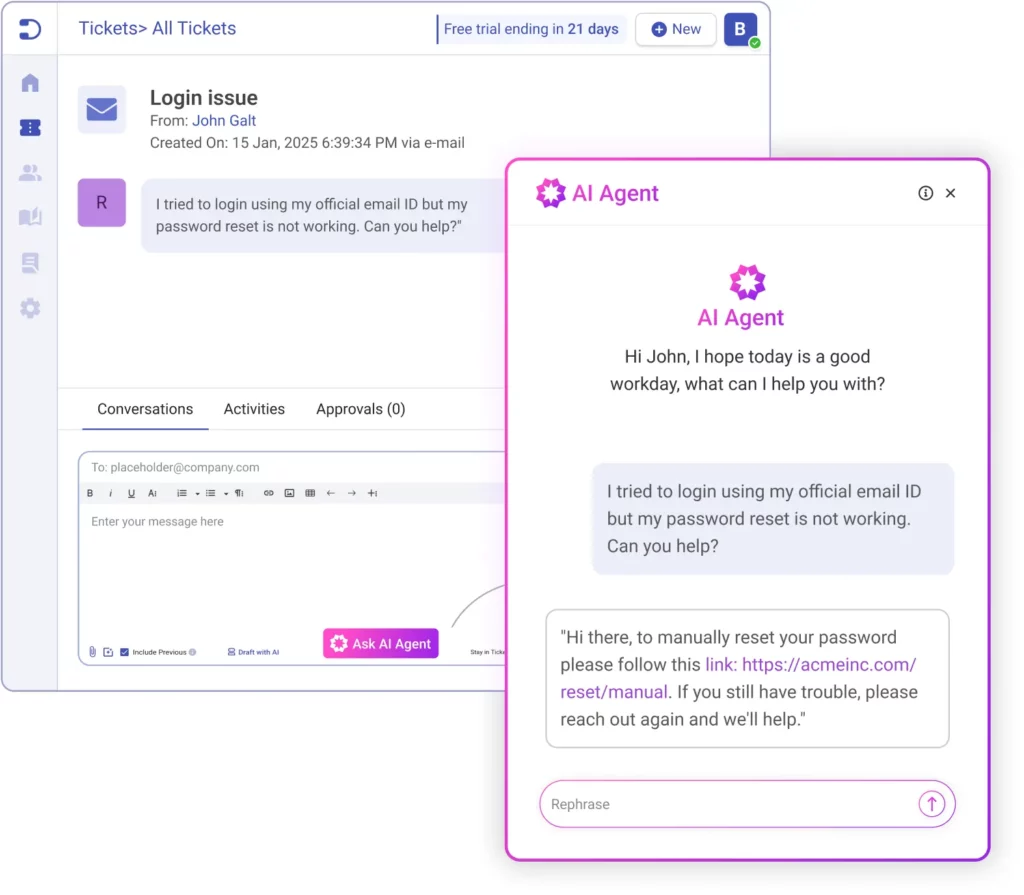
2. Service Level Agreements (SLAs)
Desk365 ensures timely resolution of tickets by monitoring SLAs. It provides periodic reminders to agents about upcoming due dates and alerts them when SLA infractions occur, helping teams stay on track and avoid delays.
3. Unified Inbox
Desk365 consolidates all customer support requests from various channels into a single, easy-to-use inbox. This feature allows agents to collaborate efficiently and manage requests without toggling between different communication platforms.
4. Automations
Desk365 offers a wide range of automation tools to improve productivity. For example, automation macros can be triggered when a ticket is created or updated, ensuring that routine tasks are handled automatically based on predefined conditions (such as ticket properties or customer events).
5. Real-time alerts and notifications
Instant notifications keep agents informed of updates to tickets. Whether it’s a new reply, a status change, or other activities, Desk365 ensures agents are aware of important developments in real-time, preventing them from missing critical updates.
6. Round-robin ticket assignment
To ensure a balanced workload, Desk365 includes a round-robin ticket assignment feature. This automatically distributes tickets to agents in a balanced way, improving response times and preventing any one agent from becoming overwhelmed.
7. Knowledge base
Desk365 makes it easy to create and share knowledge base articles with your team and customers. The knowledge base can serve as a training tool for agents, and selected solution articles can be made public on the customer support portal, allowing customers to find answers on their own.
8. Custom ticket views and reports
Desk365 offers customizable ticket views and detailed analytics that allow you to monitor your team’s performance. You can track metrics like ticket resolution time, agent performance, and customer satisfaction, helping you to make data-driven decisions to improve your support process.
9. Omnichannel support
Desk365 integrates with multiple channels, making it easy for customers to reach you through the medium they prefer. Channels include:
- Microsoft Teams: Customers can create tickets, check statuses, and respond to agents all within Teams.
- Email: Incoming emails are converted into tickets, and agents can respond directly from the platform.
- Web Widget: A customizable widget that can be embedded on your website for easy ticket creation.
- Web Form: A configurable iframe form that can also be added to your website for seamless ticket creation.
10. Customization options
Desk365 allows extensive customization to suit the specific needs of your business. You can tailor:
- Agent roles and permissions for different levels of access.
- Ticket forms with custom fields and workflows to align with your processes.
- Support portal appearance to match your branding.
- Email settings and secondary email configurations for different departments (e.g., sales, marketing).
11. Mobile accessibility
Desk365 ensures that your team can stay productive even on the go. The platform offers mobile apps for both agents and customers, allowing users to manage tickets, respond to requests, and monitor performance from their mobile devices.
12. Powerful analytics
Desk365 includes powerful reporting tools that provide actionable insights into your support operations:
- Custom reports: Tailor reports to analyze any specific data related to your team’s performance, ticket trends, or customer satisfaction.
- Agent performance reports: Evaluate individual agent metrics like response times and ticket resolution rates.
- Ticket trends report: Visualize trends across different ticket fields to identify recurring issues or bottlenecks.
2. Zoho Desk
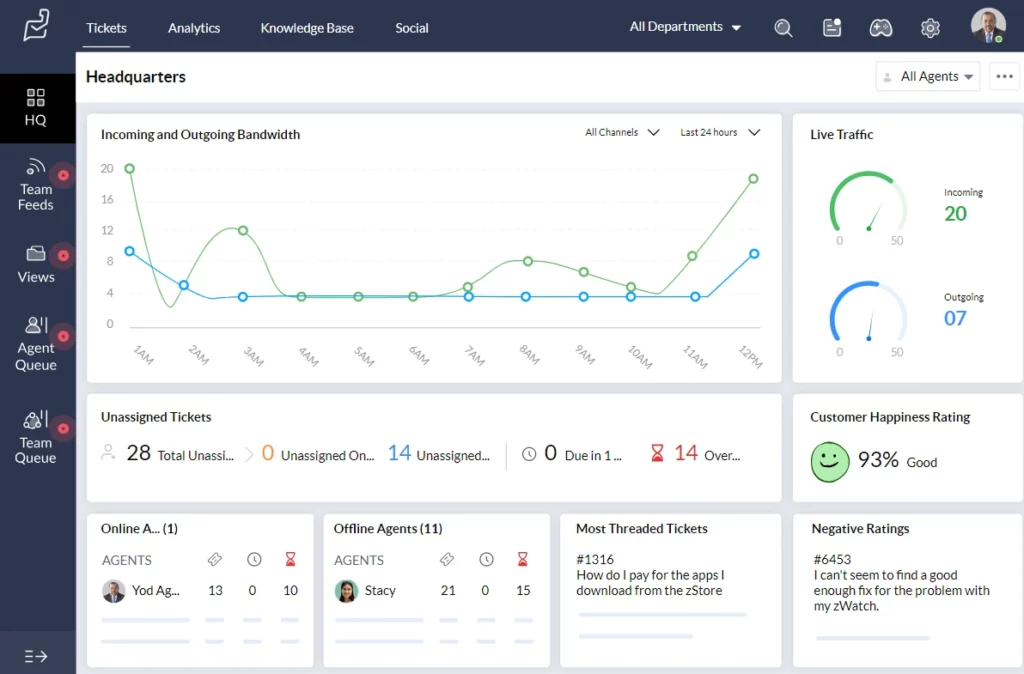
Zoho Desk is a versatile helpdesk solution known for its omnichannel support and advanced AI features. It helps businesses manage customer interactions across multiple channels, including live chat, email, social media, and phone support. Zoho Desk also offers service-level agreement (SLA) management, ticket automation, and sentiment analysis to prioritize critical tickets.
Key features
- Omnichannel support including live chat, social media, and phone.
- Automated ticket routing and workflows.
- Sentiment analysis to gauge customer satisfaction.
- Extensive knowledge base and self-service portal.
- Advanced analytics and reporting.
3. Zendesk
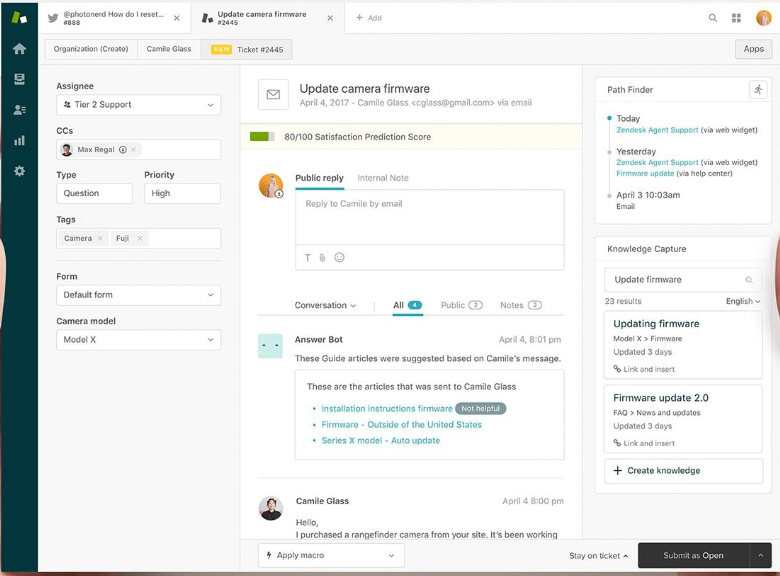
Zendesk is a widely recognized enterprise helpdesk platform that offers robust customer service tools. It is known for its intuitive interface and wide range of features, including automation, ticketing, knowledge base management, and more. Zendesk supports businesses with omnichannel capabilities, allowing customers to connect through email, chat, voice, and social media.
Key features
- Ticket management across multiple channels.
- AI-driven automation to streamline workflows.
- Knowledge base and self-service options.
- Security features like SSO and two-factor authentication.
- Customizable workflows and reporting.
4. Freshdesk
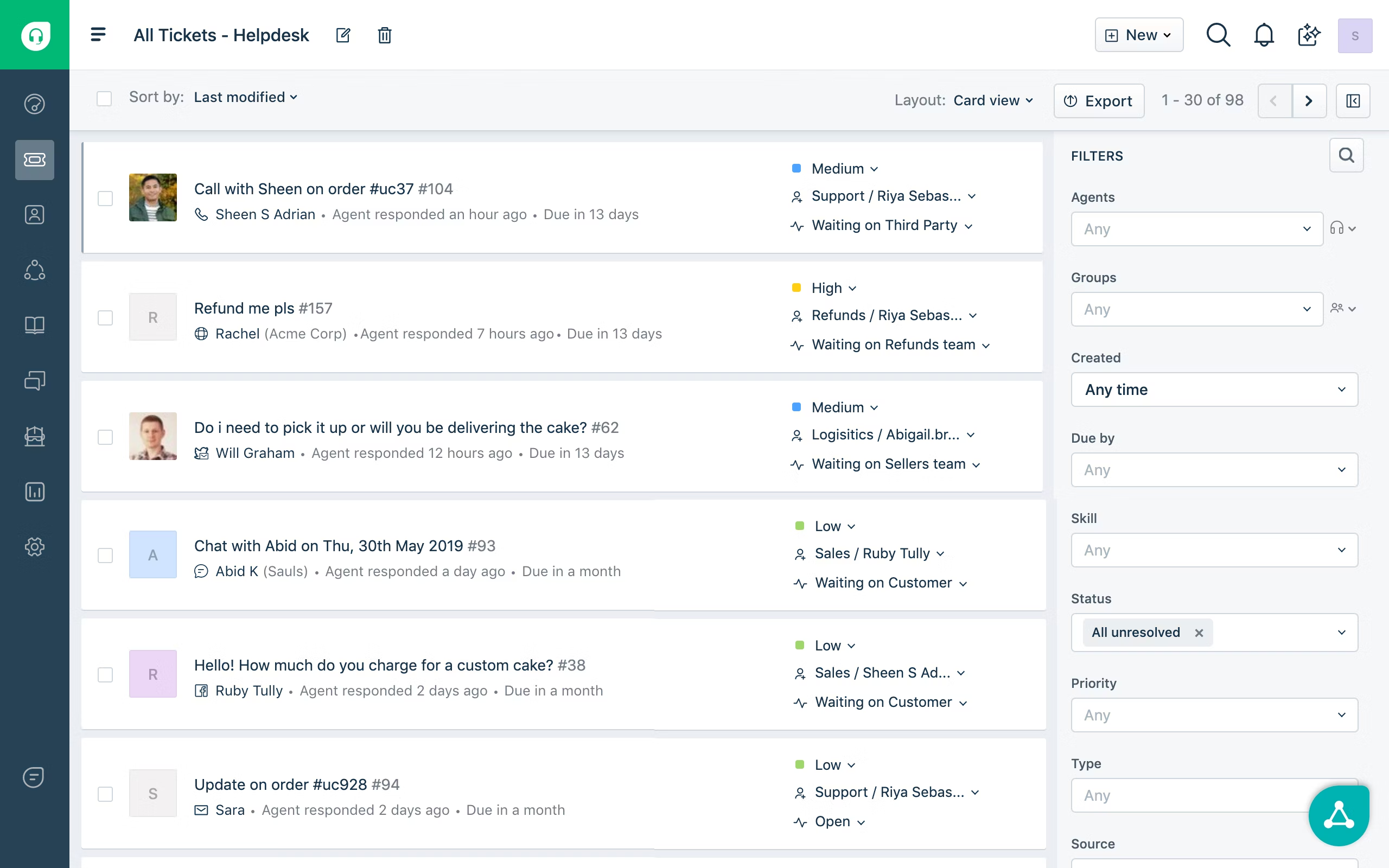
Freshdesk is an easy-to-use, scalable helpdesk solution designed for businesses of all sizes. It provides features like ticket management, SLA tracking, automated workflows, and a customizable knowledge base. Freshdesk is particularly known for its ability to simplify complex support operations while maintaining a high level of customer satisfaction.
Key features
- SLA management and ticket prioritization.
- Multi-channel support including email, live chat, and social media.
- Canned responses and automation to boost agent productivity.
- Reporting and analytics to track performance.
- Customizable ticket forms and workflows.
5. Help Scout
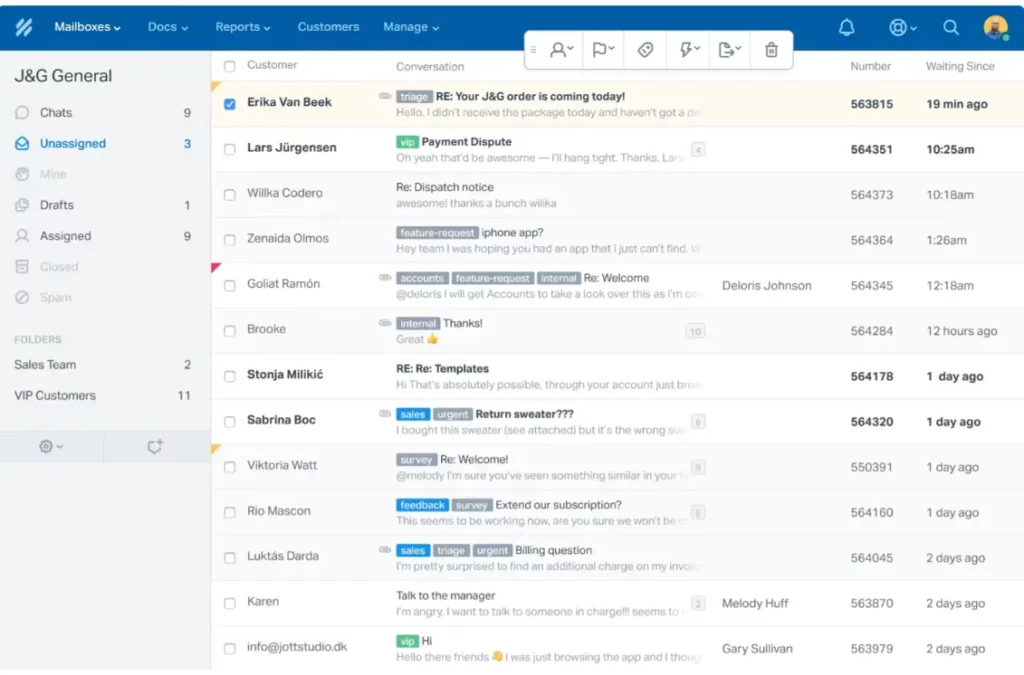
Help Scout offers a customer support platform focused on collaboration and simplicity. With its shared inbox, real-time notifications, and customer satisfaction tracking, Help Scout enables teams to handle inquiries efficiently. It’s designed to provide an excellent customer experience without overwhelming agents.
Key features
- Shared inbox for team collaboration.
- Pre-built dashboards and custom reporting.
- Integration with third-party apps like Slack and Jira.
- Knowledge base and help center for self-service.
- Real-time ticket updates and agent notifications.
How to choose the right enterprise helpdesk software?
Choosing the right enterprise helpdesk software is crucial for maintaining a smooth and efficient support process as your business grows. The right platform will not only help your agents manage high volumes of inquiries but will also enhance the overall customer experience through AI, automation, omnichannel support, and detailed analytics. By evaluating the key features and benefits of various helpdesk solutions, such as Desk365, Zoho Desk, Zendesk, Freshdesk, and Help Scout, you can make an informed decision that aligns with your organization’s unique needs. Investing in a solid enterprise helpdesk system can significantly improve your customer support quality, boost agent productivity, and ultimately, contribute to business growth.
To truly understand the value it can bring, we encourage you to start a free trial today and explore the powerful features Desk365 has to offer. Take the first step toward improving your customer support, boosting agent productivity, and driving business growth.
Experience seamless enterprise support
Frequently asked questions
An enterprise helpdesk is a support system designed for large organizations to manage and resolve customer and employee inquiries, with advanced features like automation, AI, and reporting.
Enterprise helpdesk software is designed for large organizations, offering advanced features like automation, AI, and omnichannel support, while basic solutions are for smaller businesses.
Yes, most enterprise helpdesk software can integrate with CRM systems, communication platforms, and other enterprise tools via APIs or pre-built connectors, enabling seamless workflows.
Look for scalability, automation features, integration capabilities, and ease of use, and consider starting with a free trial to test the fit.


